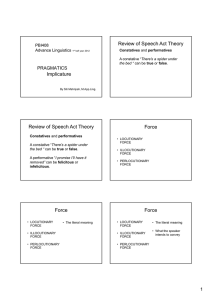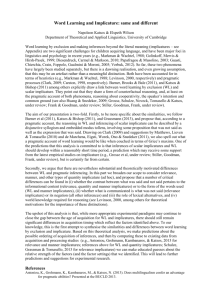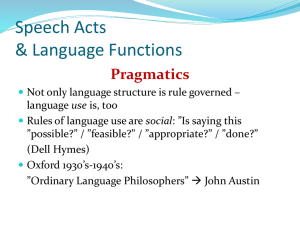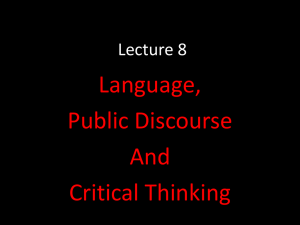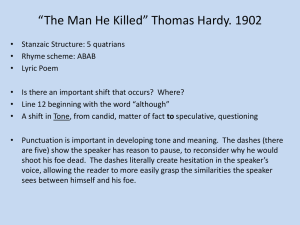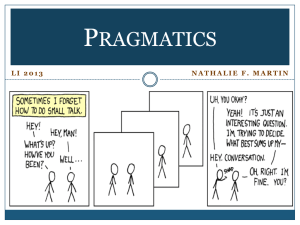Conversational implicature
advertisement
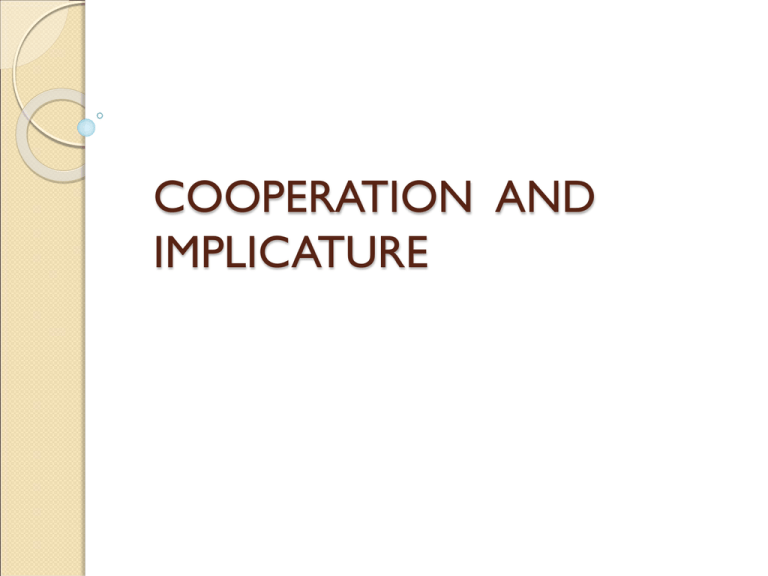
COOPERATION AND IMPLICATURE Cooperation and Implicature When people talk with each other, they try to converse smoothly and successfully. Cooperation is the basis of successful conversations. The concept and the function of cooperation and implicature are fundamentally linked. "This sense of cooperation is simply one in which people having a conversation are not normally assumed to be trying to confuse, trick, or withhold relevant information from each other" (Yule, 1996: 35). Cooperation can be understood as an essential factor when speakers and listeners are interacting, in other words, it is the expectation that the listener has towards the speaker. The speaker is supposed to convey true statements and say nothing more than what is required. Implicature can be considered as an additional conveyed meaning (Yule, 1996: 35). It is attained when a speaker intends to communicate more than just what the words mean. It is the speaker who communicates something via implicatures and the listener recognizes those communicated meanings via inference. Implicatures are inferred based on the assumption that the speaker observes or flouts some principles of cooperation (different authors have identified different principles), The most famous one: Grice – 4 principles (so called “maxims”) Literal Meaning & Implicature A: How is C getting on in his job? B: Oh quite well, I think; he likes his colleagues and he hasn’t been to prison yet. >>C is the sort of person likely can’t control himself from the temptation of his occupation >> C’s colleagues are very unpleasant etc. To understand what was said know (1) the meaning of the words, (2) the identity of he, (3) the time of utterance. A : How did you like the guest speaker? B : Well, I am sure he was speaking English. What B implied or meant is that the content of speaker’s speech is very confusing, it makes B don’t understand. A : Where is Mr. Ashuri? B : He is either in the canteen or in the Mr. Dedi’s room. What B meant is that B wants not give ambiguous or false information, that the speaker does not have the evidence to give a specific location where he believes Mr. Ashuri is. A : Will Michael be at the meeting this afternoon? B : His car broke down. What B implemented or meant is that Michel will not come to the meeting, because he got some troubles with his car, or Michael may come late to the meeting. A : Will you come to the John’s graduation ceremony? B : If I were not sick, I would come there. What B meant is that B will not come to the John’s graduation ceremony because B is sick. A : I would rather my brother go home now. What A meant is that her brother doesn’t go home now. A : Will you go to the party? B : If only I were healthy, I would be able to go the party. What B meant is that B is not healthy, so B is not able to go to the party. A : Do you know where I can get some gas? B : There is a gas station around the corner. What B implemented or meant is that the gas station is open and someone can probably get the gas there. Mrs. Rosita acts as if she were a rich woman. It means that she is not a rich woman. Even if Dona runs quickly, she won’t catch the bus. It means that Dona will never catch the bus, because it is very fast. A : Can you tell me the time? B : Well, the milk man has come. In this short conversation, A asks time to B, but B gives answer indirectly. It indicates that B may also not know the accurate time, but B is in fact giving a rough time. A : Mr. Joe is really an old bag. B : The weather has been quite delightful this summer, hasn’t it? What be implemented, suggested, or meant is that A has said is too rude, so it means that the topic must be change. A : Has Mike had a wife? B : He has been making a lot of trips to Malaysia lately. What B implied or meant is that B believe that Mike may have a wife in Malaysia. A : Where is Peter? B : The light in his office is on. What B implied or suggested or meant is that Peter is in office. A : If you don’t mind, would you accompany me going to hospital? B : Oh sure, but I have much homework today. What B implied or suggested or meant is that he cannot accompany A to go to hospital. PAUL GRICE • Grice’s aim was to understand how “speaker’s meaning” rises from “sentence meaning” ( Speaker meaning = Sentence meaning + What is implicated) • Grice proposed that many aspects of “speaker’s meaning” result from the assumption that the participants in a conversation are cooperating in an attempt to reach mutual goals – or at least are pretending to do so! Conversation is a cooperative behaviour, and therefore proceeds by rules of cooperative conduct. Grice called this the Cooperative Principle. The linguistic meaning of what is said + The information from the context (shared knowledge) + The assumption that the people speaking are observing the cooperative principle = Conversational implicature Implicature interpretation requires both Speaker and Hearer to be collaborative Ex: A. Where did you go? B. Out. A: Where does Arnold live? B: Somewhere in southern California. Jokes are a good example and often rely on the hearer’s knowledge of the rules of conversation for their humorous effect. In the following joke, the woman is violating the maxim of relevance: I came home last night, and there’s a car in the dining room. I said to my wife: “How did you get the car in the dining room?” She said: “It was easy. I made a left turn when I came out of the kitchen.” Conventional implicatures not based on cooperative principle or maxims encoded in the lexicon or grammar not dependent on context for their interpretations Ex: George is short but brave. (contrast) Sue and Bill are divorced (conjunction) He jumped on his horse and rode away. (sequence) I dropped the camera and it broke (consequence) Conventional implicature is part of the meaning of a word or construction but not part of its truthconditions. •Joe is poor but happy Assertion (pernyataan yang jelas): Joe is poor. The implicature is that not all of poor people are happy. This sentence implies poverty and happiness are not compatible but in spite of this Joe is still happy. The word of “but” create implicature of sense of contrast. •Alfie is a baby, but he is quite. The truth is that Alfie is baby. Then, the implicature is that babies are not usually quite. •Bill is still swimming. Assertion: Bill is swimming The implicature is that Bill was swimming earlier. •John is Englishman but cowardly Assertion: John is English and John is cowardly The implicature is that John is being cowardly is unexpected given his being an Englishman. •Michael is Englishman, he is, therefore, brave Assertion: Michael is English and Michael is brave. The implicature is that John’s being brave is a consequence his being an Englishman. •Mike can read German. Moreover, he can write poems in this language. Assertion: Mike can read German and Mike can write poems in this language The Implicature is that the word “German” means a language (German Language). Therefore, besides mike can read a text in German language he is also able to write a poem in German language. •He is a Chinese, he therefore uses chopsticks. Assertion: He is Chinese and he uses chopsticks The implicature: using chopsticks is Chinese habit when they were eating. •Mr. Smith leaved his office at 06.00 pm, and Gina leaved her office late too. Leaving office at 06.00 pm is late to leave some works in the office, because the time work for an employee is end at 05.00 pm. •Marry manage to answer her young sister question. Assertion: Marry answers her young sister question. Implicature: Marry found difficulty in answering her young sister question. Conversational implicatures • Inferred via the cooperative principle or maxims (observed, violated or flouted) Ex: A: I am out of petrol. B: There is a garage on the corner. According to Grice, utterance interpretation is not a matter of decoding messages, but rather involves (1) taking the meaning of the sentences together with contextual information, (2) using inference rules 3) working out what the speaker means on the basis of the assumption that the utterance conforms to the maxims. The main advantage of this approach from Grice’s point of view is that it provides a pragmatic explanation for a wide range of phenomena, especially for conversational implicatures--- a kind of extra meaning that is not literally contained in the utterance. Ex. (1) Husband: Where are the car keys? Wife: They’re on the table in the hall. The wife has answered clearly (manner) and truthfully (Quality), has given just the right amount of information (Quantity) and has directly addressed her husband’s goal in asking the question (Relation). She has said precisely what she meant, no more and no less. (2) Budi says,” He is a tiger.” Example (2) is literally false, openly against the maxim of quality, for no human is a tiger. But the hearer still assumes that the speaker is being cooperative and then infers that he is trying to say something distinct from the literal meaning. He can then work out that probably the speaker meant to say that “he has some characteristics of a tiger”. (3) someone says “Tom has wooden ears”. Sentence (3) is obviously false most natural contexts and the speaker in uttering it flouts the first maxim of quality. Generalized conversational implicatures • independent of the context Ex.: Indefinites A car collided with John’s foot. (not John’s car / not the speaker’s car) the speaker is assumed to follow the maxim of quantity, if he wanted to be more specific/informative he would have said my car or John’s car –Generalized implicature: inferred without a special reference to context: •John walked into a house yesterday. Infer that the house was not John’s house Yesterday there was a naughty boy throwing my windows by stones. –Particularized implicature – inferred only due to a special context between particular speaker and hearer. A: Can you tell me the time? B: Well, the milkman is here. It must be the time when the milkman comes. •Particularized implicature dependens on a specific context Ex.: Rick: Hey, coming to the party tonight? Tom: My parents are visiting. (flouting relevance) Ann: Where are you going with the dog? Sam: To the V.E.T. (veterinarian/ahli hewan)/(flouting manner) Bert: Do you like ice-cream? Ernie: Is the Pope Catholic? (flouting relevance) Other type of Implicature Scalar Implicature Lexical (and logical) scales: all, most, many, some Numbers According to the cooperation principles, the speaker must use the right member of the scale Scalar implicatures communicated by choosing a word expressing a value from a scale (quantity, frequency, etc.) I’m studying linguistics and I’ve completed some of the required courses (not all) If the scale is all, most, many, some, few...., the use of some implicates that all the higher items in the scale are to be considered negative. Examples of Scalar Implicature Bill has got some of Chomsky’s papers Infer that Bill does not have all the Chomsky’s papers There will be five of us for dinner tonight Infer that there will not be more than five of us for dinner tonight What is actually Paul Grice aiming at? An outline of a systematic theory of language use which tries to bridge the gap between the truth-conditional interpretation of expressions (along the lines of a formal logic) and the wider meaning (what is said + what is implicated) which they take on in everyday conversation. .

